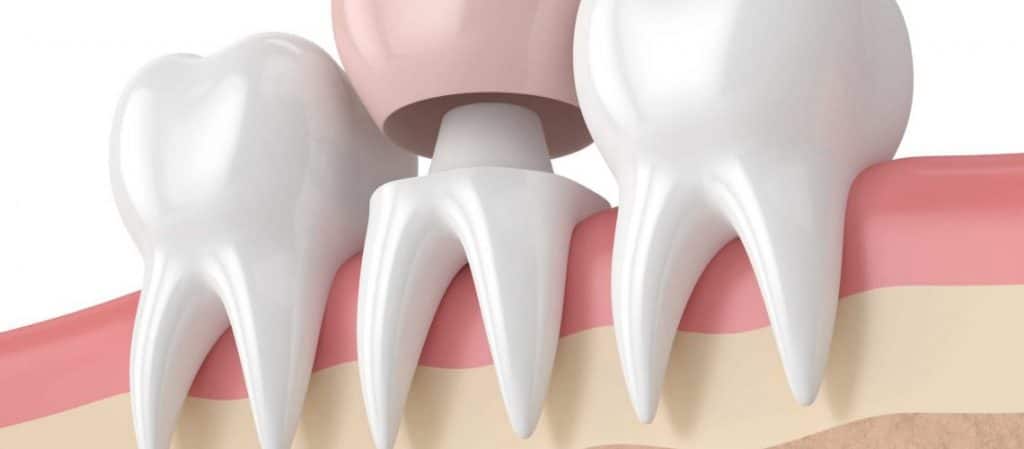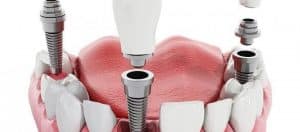Porcelain Crowns: Everything You Need to Know In 2022
Dental crowns, often called “crowns,” are dental prosthetic devices designed to cover or cap a damaged or weakened tooth. They are custom-made to fit over the entire visible portion of the tooth above the gumline, effectively encasing it.
Different Types of Dental Crowns
Dental crowns offer a range of choices to suit various dental needs, with some of the most common types being ceramic or porcelain crowns, porcelain fused to metal (PFM) peaks, gold alloys, and base metal alloys.
Porcelain crowns are quite popular, which look like your real teeth and blend in well. They’re the preferred choice of many because they can make it hard for people to tell that they’re not your natural teeth.
Porcelain crowns are individually crafted caps made from porcelain. They are designed to cover a damaged tooth, restoring its strength, function, and appearance. To ensure a natural look, your dentist uses porcelain that matches the colour of your other teeth. This way, they enhance your teeth’ functionality and contribute to a more attractive and seamless smile.
Porcelain crowns are the best alternative for a tooth that cannot be strengthened or protected by fillings or other dental procedures. However, you need a qualified dentist to properly fit a porcelain crown to your teeth.
Porcelain Crowns vs. Veneers
Porcelain crowns and veneers are both cosmetic dental treatments aimed at improving the appearance of your teeth, especially when faced with issues like damage or discolouration, which are often more noticeable on the front teeth.
Porcelain crowns, also known as dental caps, enhance aesthetics while restoring and reinforcing the strength of a damaged or compromised tooth. They encompass the entire visible portion of the tooth above the gumline, offering both cosmetic improvement and structural support. This makes them suitable for teeth with significant structural issues, such as large cavities or fractures.
On the other hand, veneers are primarily focused on cosmetic enhancements. Composed of ultra-thin porcelain shells, veneers are meticulously bonded to the tooth’s front surface. They improve teeth’ appearance by enhancing colour, shape, size, and alignment. However, veneers are not designed to strengthen or restore the structural integrity of a tooth.
Porcelain Crowns on Your Front Teeth
Many people choose to get porcelain crowns on their front teeth because these teeth are the ones that can be seen the most when you smile. Dental crowns on these teeth can change how your smile looks.
When your front teeth are damaged, it can be a problem for your health, self-confidence, and how you see yourself. Having healthy and good-looking teeth can make you feel better about yourself and improve your life in many ways.
Porcelain Crowns on Your Molars
Porcelain crowns can go on the back teeth, called molars, too. But because you can’t usually see them when you smile, dentists often suggest using metal crowns for these teeth since they are very strong unless you have allergies to some metals.
Your dentist can help you decide which crown is best for you. It depends on what’s wrong with your teeth and whether they’re at the front where people can see them or at the back where they can’t.
Porcelain Crown Procedures
Two different dental appointments are required to get a porcelain crown fixed. During the initial appointment, your dentist digitally scans your tooth to produce a dental impression or mould. Next, they will send the mould or image to a dental laboratory to create custom crowns. Until your permanent crown is ready, the dentist will apply a temporary crown to your tooth.
Your dentist will contact you to schedule the second appointment once the new permanent crown is ready. After your initial meeting, you can have your second visit two or three weeks later. Your dentist will meticulously attach and secure the permanent crown during this appointment.
Is Getting a Porcelain Crown a Very Painful Process?
Getting a porcelain crown is generally a smooth process. While you may feel discomfort when your dentist places the permanent crown, the good news is that your dentist will use local anaesthesia to numb the area, making it a more comfortable experience for you. Any potential soreness after the procedure is typically short-lived. You shouldn’t expect to feel much pain or discomfort throughout the entire treatment. Your dentist takes steps to ensure your comfort during the process.
How Long Will It Take to Recover?
Recovery from a porcelain crown placement typically takes a few days, with mild soreness, sensitivity, and numbness lasting a few hours to several days. Resume normal activities shortly after the procedure but avoid hot liquids and hard foods immediately to protect the crown. If you experience significant pain, fever symptoms, or issues with biting, contact your dentist promptly.
How Long Do Porcelain Crowns Last?
Porcelain crowns can last 10 to 15 years or even longer with proper care and maintenance.
Some factors that affect the life of your crowns are
- Oral Hygiene
- Diet and Habits
- Material Quality
- Dentist’s Skill
- Bite Alignment
- Oral Health
- Regular Maintenance
- Lifestyle Factors
- Accidents or Trauma
- Natural Wear and Tear
How Much Do Porcelain Crowns Cost?
The cost of porcelain crowns can vary widely based on several factors, including your location, the complexity of the dental procedure, the type of crown (all-porcelain, porcelain-fused-to-metal, etc.), and the dentist’s fees. It’s essential to consult with your dentist to get a precise cost estimate based on your specific needs and location. Dental insurance may also cover a portion of the cost in some cases.
Schedule A Consultation to Obtain a Superior Porcelain Crown
A dental crown helps to cover decayed or broken teeth and enhance smiles. With a skilled dentist, getting a high-quality porcelain crown is comparatively simple.
A specialised group of cosmetic dentists work for Bay Street Dental Group. They are adept at applying their knowledge and experience to precisely position the crown in your mouth. As a result, your teeth’s durability, strength, and aesthetics are enhanced by crowns. To learn more about our porcelain crown services, call us at (03) 9646 2577 or email us at (03) 9646 2577 or email us at [email protected].
Frequently Asked Questions
How Long Does a Porcelain Crown on A Front Tooth Last?
Porcelain crowns are durable and can last a lifetime. A porcelain crown, however, is known to last between five and fifteen years. If you want to lengthen the lifespan of your porcelain crowns, you must care for them correctly and get regular checkups. In addition, you must see the dentist every six months. They replace them if they discover a chipped or cracked crown.
Instead of replacing the entire crown, your dentist may use composite resin to repair tiny chips in porcelain crowns. But if there are significant chips or wear, your dentist might decide to replace the crown completely.
How Can I Repair My Crooked Crown?
Dental crowns may become loose or fall off if fitted improperly, or the cement deteriorates over time. If your crown is not securely fastened, speak with your dentist. Any time a loose crown could fall off, it might let bacteria in, causing tooth decay and other oral issues.
If your crown becomes loose before seeing a dentist, you can temporarily reconnect it with over-the-counter dental adhesive. Pay attention to calling your dentist right away in any circumstance. If necessary, your dentist will be able to repair or replace them.
Which is Better for Me: Porcelain Veneers or Crowns?
Both porcelain crowns and veneers enhance the aesthetic appeal of your teeth. However, crowns or caps can completely encase your teeth, offering an appropriate treatment for teeth that are significantly damaged. They also improve your teeth functionality. Additionally, crowns are beneficial in cases of root canal therapy and substantial fillings.
Porcelain veneers are designed to improve teeth’ aesthetic qualities rather than functionality. They are, therefore, perfect for your stained, damaged, or irregular teeth.
Veneers focus more on enhancing the aesthetics of your teeth than on enhancing their functionality. However, crowns can improve the teeth’s aesthetics and functionality.












